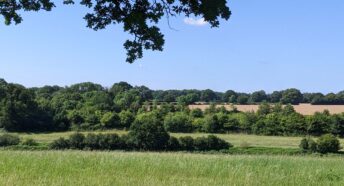Don’t cave in to the drinks industry lobbyists! CPRE urges government to adopt ‘all-in’ deposit return system

More than one in four bottles littering our countryside may not be included in the deposit return scheme (DRS) if the government buckles under pressure from industry, according to CPRE.
Responding to the publication of the Environment Bill, which will allow for the creation of the DRS, CPRE is urging the government to continue with its ambition for all drinks containers – no matter the size or material – to be included in the system and not fold under industry lobbying.
The Bill allows for the creation of the DRS but does not specify what will be included or when it will be introduced.
Evidence for an ‘all-in’ scheme continues to build, with the CPRE’s Green Clean, a nationwide litter-pick carried out in September, suggesting that millions of drinks containers would still end up littering our countryside if industry secured a limited system to serve their vested interests.
Key stats from CPRE’s Green Clean, which took place across England, include:
- Almost a quarter (23%) of glass bottles collected were over the 750ml size limit, the current upper limit for the ‘on the go’ DRS being pushed by key industries
- More than a quarter (28%) of plastic bottles found littering the countryside were larger than the common 500ml bottle size and could be excluded from the scheme being pushed by key industry stakeholders
- Some 7,500 drinks containers were collected during the month-long litter-pick, including cans, plastic bottles of all sizes and glass bottles
Additionally, more than one in 10 drinks containers collected were glass, a figure that does not include the shattered pieces of glass volunteers were unable to count. These would all be left to harm people, and wildlife, should industry succeed in excluding glass from the deposit return scheme.
Tom Fyans, CPRE deputy chief executive, said: “It’s great to see the government include powers to introduce a DRS in the Environment Bill, but as the results of our nationwide litter-pick demonstrate, to be an effective deterrent to the high volumes of waste polluting our natural environment, it must cover all materials of all sizes.
“To boost recycling rates for all drinks containers – cans, glass and plastic bottles, cartons and pouches – the only option is for the government to introduce an ‘all-in’ system.
“The industries that would be required to pay for the deposit return scheme continue to try to limit its scope, but we urge the government to prioritise the needs of the environment and society over corporate vested interests.
“As the Secretary of State for the Environment announced the publication of the Environment Bill, it was encouraging to hear her recognise the benefits of the DRS in England being the same as the DRS being introduced in Scotland, which will be ‘all-in’.
“This provides further hope that the government is listening as we make the case for an ambitious approach to tackling the problem of litter. But there is no time to waste, so we hope the DRS element of the Bill will be a priority as the government takes forward this vital piece of legislation.”
Monday,
October 28, 2019
- A number of important documents have yet to emerge. For example, a rigorous transport plan and a finalised air-quality assessment. The latter is critical given that allocations at Teynham will feed extra traffic into AQMAs.
- There seems to be no coherent plan for infrastructure delivery – a key component of the plan given the allocations being proposed near the already crowded Junction 7.
- There seems to have been little or no cooperation with neighbouring boroughs or even parish councils within Swale itself.
The removal of a second consultation might have been understandable if this final version of the plan were similar to that being talked about at the beginning of the consultation process. It is, however, radically different in the following ways:
- There has been a major shift in the balance of housing allocations, away from the west of the borough over to the east, especially around the historic town of Faversham. This is a move that raises many concerns.
- A new large allocation, with accompanying A2 bypass, has appeared around Teynham and Lynsted, to which we are objecting.
- Housing allocations in the AONB around Neames Forstal that were judged “unsuitable” by the council’s own officers have now appeared as part of the housing numbers.
- Most of the housing allocations being proposed are on greenfield sites, many of them on Grade 1 agricultural land – a point to which we are strongly objecting.
Concerns about the rush to submit the plan
The haste with which the plan is being prepared is especially worrying given the concentration of housing in Faversham. If the town is to take a large amount of new housing, it is imperative that the policies concerning the area are carefully worked out to preserve, as far as possible, the unique nature of the town. The rush to submit the plan is likely to prove detrimental.
As Swale does not have a five-year land housing supply, it is open to speculative development proposals, many of which would run counter to the ideas contained in the current plan. Some are already appearing. This is a common situation, and one that, doubtless, is a reason behind Swale’s haste.
Our overriding fear, however, is that this emphasis on haste is ultimately going to prove counterproductive. This is because it is our view that the plan, in its current form, is unlikely to pass independent examination. We are urging Swale to listen to and act upon the comments being made about the plan and to return the plan to the council with appropriate modifications before submitting it to the Secretary of State.
Essentially, this means treating the current consultation not as the final one but as the ‘lost’ second consultation.
The consultation ends on Friday 30 April and we strongly urge residents to make their opinions known if they have not already done so.
Further information








